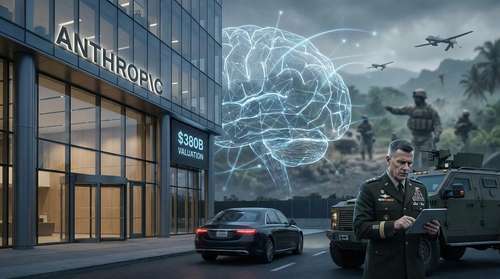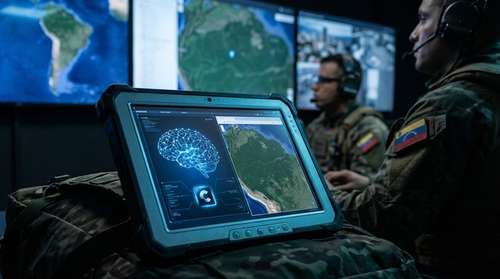In a year marked by technological uproar, the resounding impact of Artificial Intelligence (AI) in 2023 emerged as a transformative force, reshaping the world in distinctive ways.
The growth rate of AI technology, particularly embodied by ChatGPT, birthed by OpenAI, spurred a chain reaction of advancements and challenges across diverse sectors. Indicating a new era posed with potential risks.
-
The Rise of Illusory Narratives
In the development of AI, ChatGPT played a significant role by causing an increase in false narratives, deepfakes, and misinformation.
Its advanced capabilities enabled bad actors to alter global events, create fake political conversations, and distort realities affected by conflict.
This surge highlights the urgent need for transparency in sourcing information, a critical requirement in today's era of digital news consumption and AI-generated content.
Also, the attainability of this technology has raised concerns about the authenticity and reliability of information disseminated. Necessitating robust mechanisms to differentiate reality from manipulated narratives, is an imperative task amidst the era of misinformation.
-
Solving the Threads of Authenticity in Media
AI incursion into content generation blurred the lines between authenticity and artificiality, prompting a paradigm shift in the media.
Esteemed brands like CNET and Sports recently boldly embraced AI-generated news stories, sparking discussions on the necessity of universal guidelines governing the usage of such content.
Also, initiatives like the Coalition for Content Provenance and Authenticity showed promising strides in verifying content origins through innovative metadata utilization.
This evolution highlights the need for comprehensive guidelines to maintain journalistic integrity and authenticity amidst the influx of AI-generated content in media spheres, steering discussions toward establishing standardized practices in content generation and verification.
-
Charting a Global Path to AI Safety
The remarkable success of ChatGPT triggered a diplomatic agreement among 29 countries and organizations at the UK AI Safety Summit.
This agreement resulted in the Bletchley Declaration, which recognized the potential benefits of Artificial Intelligence (AI) while pledging to ensure its responsible deployment.
This historic event also led to the formation of AI Safety Institutes in the U.K. and the U.S. This signifies a global commitment to regulate and monitor AI's societal impact.
So the need lies in prioritizing the safe deployment of AI technologies and fostering collaboration on an international scale to ensure ethical and responsible use while maximizing the potential benefits of AI across diverse sectors.
-
Governments Rally for AI Safety – Regulatory Reconfigurations
ChatGPT's integration into various sectors raised governmental initiatives worldwide, leading to the formulation of regulatory frameworks by entities like the European Union, China, the United States, and the United Kingdom.
These frameworks aimed to ensure the conscientious and secure deployment of AI technologies, emphasizing responsible practices within dynamic technology.
Additionally, non-binding agreements and regional compacts amplified the urgency of addressing AI safety concerns, highlighting a collective commitment to ethical AI deployment.
The regulations surrounding AI signify a pivotal moment. Signalling a concerted effort to navigate the ethical complexities of AI integration across industries while safeguarding against its potential risks and harms.
-
Evolving Workshops and Job Disruptions
The introduction of ChatGPT's generative AI capabilities triggered debates on the future trajectory of the labor market. Headlines ominously predicted widespread disruptions in employment, compelling corporations to grapple with the seamless integration of AI into their operations while ensuring transparency.
The launch of ChatGPT-4 aimed to streamline AI technology assimilation within organizational frameworks, reshaping the employment sector.
This shift toward collaborative roles between AI and human workers shows the necessity of striking a balance between fostering innovation and preserving job security. Also, it emphasizes the symbiotic relationship between humans and AI in the workplace.

Additional Impactful Scenarios of AI in 2023
-
Redefining Strategies in Homeland Security and Warfare
With ChatGPT's analytical capabilities, the U.S. Department of Defense established a generative AI task force, exploring responsible AI applications in modern warfare. Discussions revolved around leveraging AI for risk assessment, intelligence evaluation, and optimizing military operations.
Despite concerns about AI-centric warfare, experts emphasized the indispensability of human oversight in implementing AI-generated strategies.
-
Confronting Bias, a Persistent Challenge
As ChatGPT ascended, addressing biases in AI gained prominence. OpenAI acknowledged biases in ChatGPT's responses, emphasizing ongoing research for mitigation.
Initiatives like Stanford University's Foundation Model Transparency Index assessed Big Tech's transparency in training AI models. The focus on biases tied to governmental concerns around AI safety shows the necessity of transparency in AI model training.
-
Cybersecurity Challenges in the Age of ChatGPT
The widespread use of ChatGPT posed new challenges for cybersecurity, anticipating innovative attacks that could subvert traditional security measures. Cybercriminals leveraged AI to automate attacks, heightening the sophistication of phishing attempts.
Despite these challenges, cybersecurity analysts found opportunities to utilize AI, including ChatGPT, in identifying vulnerabilities and aiding in penetration testing.
-
Education Sector in the ChatGPT Era
ChatGPT's swift integration into educational settings raised queries about AI integration within classrooms. Students increasingly sought its assistance in assignments, posing challenges for educators to adapt to this pedagogical entity.
Discussions around permissible applications of generative AI tools highlighted the need for well-defined policies in education, urging educators to reconsider traditional assessment methods amidst AI instantaneous solutions.
-
Copyright Conundrum and the AI Frontier
The integration of ChatGPT into creative processes sparked complexities around copyright ownership. Questions arose regarding the originality of AI-generated content and the accountability of AI entities.
Lawsuits like The New York Times' case against OpenAI and Microsoft show copyright challenges, setting the stage for future legal proceedings in the relationship between media, publishing, and AI entities.
The advent of AI in 2023 unleashed a whirlwind of transformative scenarios, challenging societies, governments, and industries to adapt to an evolving technological landscape.
As the global AI race unfolds, it becomes imperative to address ethical dilemmas, formulate robust regulations, and foster collaborative approaches to harness AI's potential while mitigating risks.
The ramifications of AI's growth rate in 2023 resonate far beyond the immediate present, shaping the trajectory of technology, diplomacy, and global influence.
As nations and corporations vie for dominance in the AI landscape, the journey ahead is fraught with both unprecedented challenges and opportunities, heralding an era defined by the relentless pursuit of innovation and ethical stewardship in an AI-driven world.




